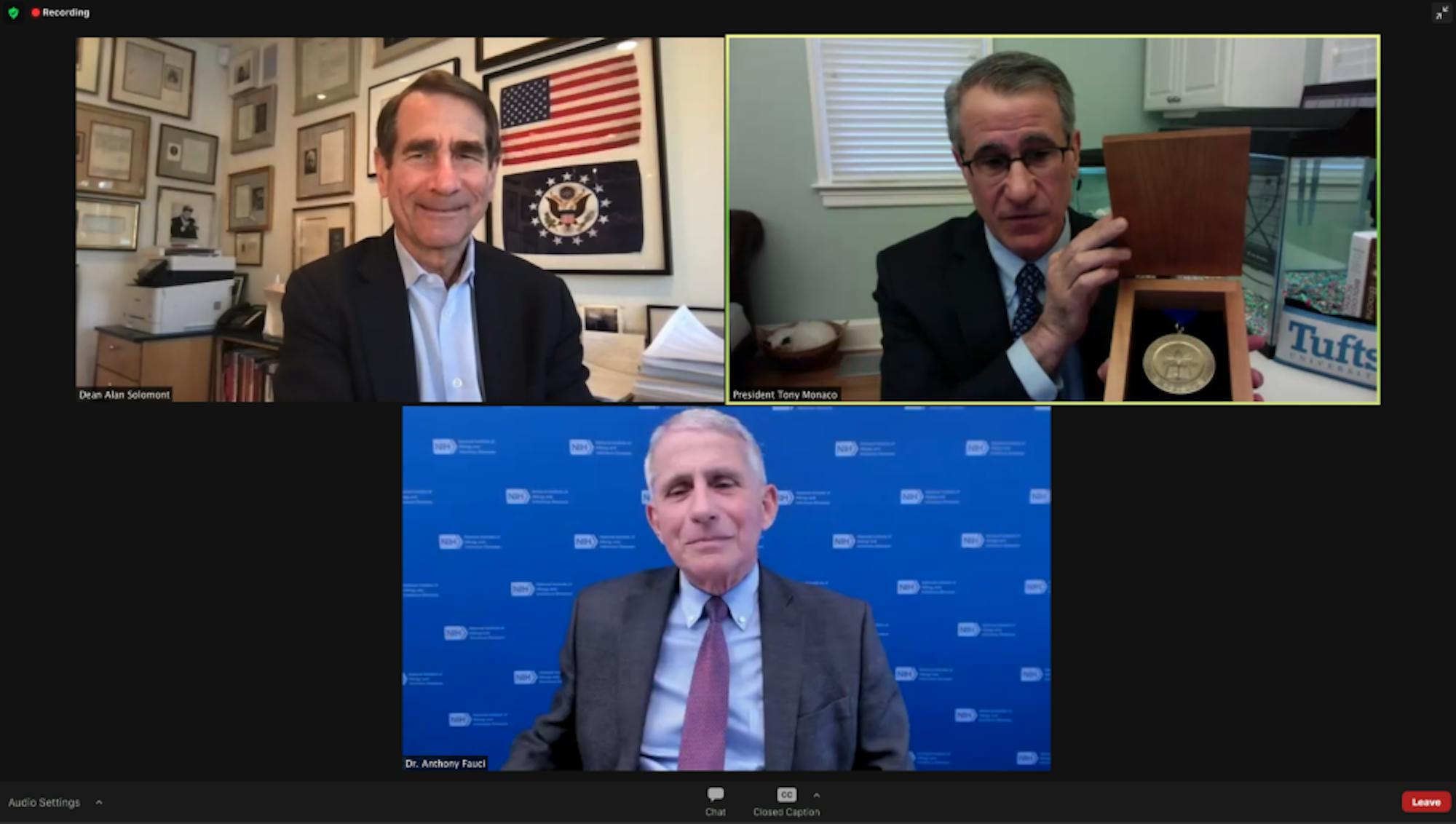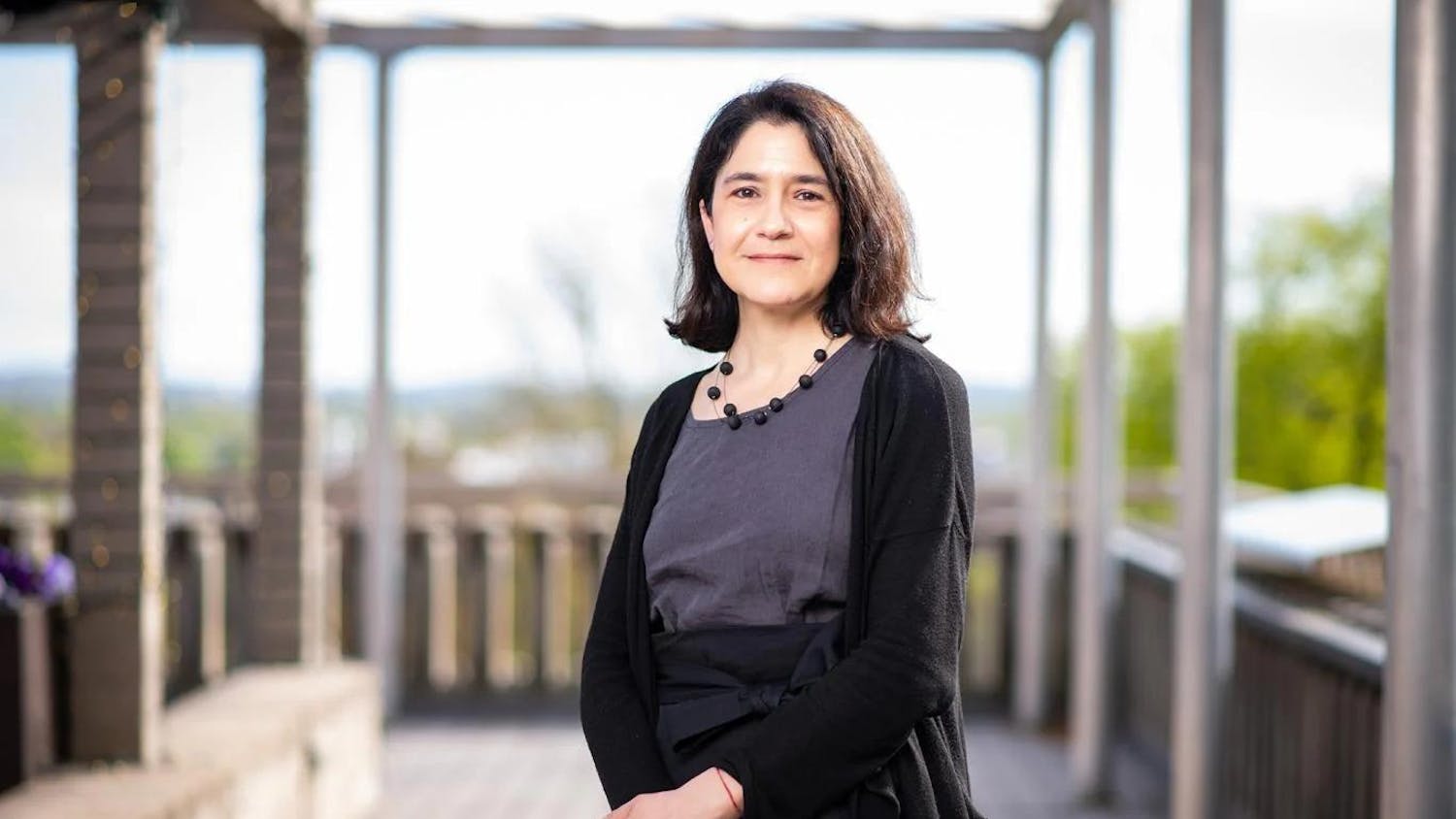Dr. Anthony Fauci spoke about his journey through medicine, HIV/AIDS activism, the COVID-19 pandemic and the intersections of public health and politics in a live-streamed conversation with the Tufts community on Monday.
Fauci, who has served as the director of the National Institute of Allergy and Infectious Diseases since 1984, was invited to speak at Tufts as a part of the Jonathan M. Tisch College of Civic Life’s Distinguished Speaker Series. Fauci has servedunder seven administrations and has been nationally recognized as a leading expert in infectious disease during the COVID-19 pandemic.
University President Anthony Monaco opened the event — which was held virtually to an audience of over 4,000 — by welcoming Fauci to Tufts. He outlined Fauci’s experiences combating several epidemics in the United States and praised him as a trusted medical voice during the nation’s response to the COVID-19 pandemic.
“His leadership during this pandemic has made him a national treasure,” Monaco said.
Monaco then presented Fauci with the Tufts University Presidential Medal in recognition of his contributions to public health during the COVID-19 pandemic. The Presidential Medal, which was established in 1976, is one of the highest honors given to individuals by the University.
“Thank you very much for this wonderful honor of the Tufts University Presidential Medal,” Fauci said. “I truly appreciate it and I am humbled by it.”
The event was moderated by Alan Solomont, dean of Tisch College, who began the conversation by asking Fauci about his relationship with Dr. Sheldon Wolff, a physician who mentored Fauci during his first years at the National Institute of Allergy and Infectious Diseases. Wolff served as the chairman of the department of medicine at the Tufts University School of Medicine from 1977 until his death in 1994.
Fauci attributed a portion of his accomplishments during his career to the mentorship of Wolff. He explained that early on, Wolff gave him unique responsibilities on projects that involved scientific research with patients.
“He launched me on my career,” Fauci said. “I think that’s the lesson of the day for younger people who are listening: Get a good mentor, and be a good mentor.”
Solomont then transitioned to asking Fauci about his role at the National Institute of Allergy and Infectious Diseases during the HIV/AIDS epidemic, which began in 1981.
Fauci said that he first noticed a public health anomaly when he read a June 5, 1981 Mortality-Morbidity Weekly Report that detailed the cases of five young gay men who had presented unusual cases of pneumonia. When 26 more young gay men presented with similar conditions just a month later, Fauci realized the urgency of the situation.
“I looked at that, and I actually got goosebumps,” Fauci said. “I said ‘oh my God,' we are dealing with a brand new infection.’”
This early realization regarding the severity of the HIV/AIDS epidemic influenced Fauci to change the direction of his career. In the years that followed, he prioritized treating gay men who had contracted HIV/AIDS, whom he cited as being heavily stigmatized during the time.
Solomont also asked Fauci about the role of activism during the HIV/AIDS epidemic. During the 1980s, at the height of the epidemic, several demonstrations were held across the country protesting the Reagan administration’s response to the epidemic.
Fauci answered by saying that, unlike many public officials, he responded to the protests by listening to the concerns of HIV/AIDS activists.
“I did something, which was probably the smartest thing I’ve ever done in my career outside of scientific things, and that is I said ‘Let me listen to these people,’” Fauci said. “They were making perfect sense.”
Fauci said that this initial dialogue with activists has carried on to influence public health spheres in the present day, citing the activist community as members of key advisory committees and councils.
The conversation then transitioned into a discussion about the COVID-19 pandemic. In the past, Fauci has had experience combating the HIV/AIDS, SARS, H1N1, Ebola and Zika epidemics in the United States. Solomont asked Fauci what made the COVID-19 pandemic different from previous epidemics.
Fauci responded by likening COVID-19 to his worst nightmare. He said that his biggest fear was of a novel, zoonotic virus that could easily spread and had a high degree of morbidity and mortality, all of which are characteristics of COVID-19.
“It turns out that in January of 2020, my worst nightmare came true,” Fauci said. “We’ve been living in it for over a year because we have a disease that’s spectacularly effective in spreading from person to person.”
Transmission of COVID-19 through asymptomatic carriers also makes the virus particularly difficult to control, according to Fauci. He added that early last year, he could not have predicted the toll that the virus would impose on the United States and across the world.
Fauci also spoke about the U.S. government’s role in combating the virus.
“Even if the government did everything perfectly well, we still would have a really serious problem,” Fauci said. “We had a double whammy against us, because we had an outbreak in the middle of one of the most divisive times, literally, in the history of our country.”
Fauci suggested that political divisiveness may have posed a barrier in the United States’ response to the COVID-19 pandemic. In his answer, he referenced past political divisiveness.
“There were times when there were political differences, but not such great divisiveness that the different groups hated each other. That makes it very difficult to do something together,” Fauci said. “The common enemy is the virus, and when you have a common enemy, the only way you can attack that common enemy is when everybody pulls together.”
Solomont then asked Fauci about the differences between advising the Trump and Biden administrations. While Fauci said that he did not wish to speak too much about the Trump administration, he believed that he was put in a difficult situation.
“I don’t really want to rehash the Trump administration, because it speaks for itself,” Fauci said. “I did not like at all the fact that I had to, under certain circumstances, contradict the president.”
Fauci said that he found former President Donald Trump to have likable characteristics. He added, however, that tension grew between the two over the course of the pandemic.
“He has some characteristics that are quite likable when you get to know him,” Fauci said. “But you know, when he said things that were just not scientifically correct, I didn’t take any pleasure in contradicting him, but I had to do that.”
When Solomont asked what had stopped him from stepping down from his position under the Trump administration, Fauci said that he believed his departure would leave a vacuum in which less truthful, non-evidence-based data could circulate in conversations about public health.
“I thought if I did leave, I would make matters worse,” Fauci said. “Now, we’re in a totally different situation with the Biden administration. It’s very clear that science does rule, and evidence and data really determine what we do.”
The rest of the conversation focused on Fauci’s predictions for the future of the pandemic. Fauci said he believes that high school students are likely to return to school in the fall and that increased vaccine rollout will minimize the risk of infection from the virus.
Fauci included that he believes that a lot of work needs to be done in focusing on equity of vaccine distribution in Black and Latinx communities, which have been disproportionately affected by COVID-19. He said that prioritizing equity in these communities is at the top of Biden’s agenda.
“Equity is now the whole goal of the Biden administration,” Fauci said. “He’s made it very clear that in everything we do with COVID-19, and therapeutics and vaccines, equity has to be the top front burner for us.”
The discussion concluded with Fauci taking questions from students, where he reemphasized the importance of recognizing the social determinants of health, which is a concept used by public health professionals to describe certain social aspects — including race, socioeconomic status and personal environment — that may put some individuals at higher risks for adverse outcomes of disease.






